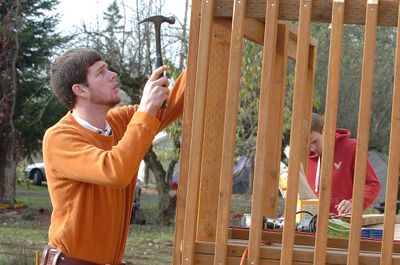Serving country through deeds
Young Mennonite men follow tradition of volunteerism

CENTRALIA, Wash. – It’s hard to imagine that four “boys” no older than 22, hailing from cities and states halfway across the country, could make such an impact in a flood disaster zone they barely knew about.
But all one would have to do is just ask any number of people they have helped.
“They did the bucket brigade, of emptying the hot water heater,” said Tina Kendall, whose Centralia home filled up with 14 inches of water last December. “I’ve never seen four people work so hard and so fast.”
And everyone that they help will describe their hard work and their work ethic, but everyone also seemed to be in agreement when describing who they were as people.
“They were gentle,” said Lyn Sanchez, who now lives in a manufactured home in Littell after the home she lived in for 17 years was moved from its foundation and destroyed during the flood. “They asked, ‘What do you need to get done?’ And then set about doing it, detail by detail.”
When speaking with the Lewis County Long-Term Recovery Organization, which refers them to most of their jobs, Sharon Gober, executive director, said that from June through November, they had logged in 2,234 hours of service.
“These young gentleman are amazing,” Gober said. “They have helped so many families. I can’t even begin to say how helpful they’ve been.”
The question still remains, however: Who are these boys?
In short, they are Mennonites, a pacifist Christian denomination whose members give service to their country through volunteerism, rather than through the military and war.
There are currently eight different “boys units” across the country. Each unit is made up of four “boys” and is watched over by “house parents,” each in an area that has been devastated by a natural disaster, or where large-scale humanitarian work is needed.
Outside of Lewis County, six of the eight units are found along the Gulf Coast in Texas, Louisiana and Mississippi, where work is ongoing to help recover from Hurricane Katrina. The last site is in New Mexico, where humanitarian work is being done.
But to describe them simply as Mennonites would be disingenuous and deceiving, because though they share common bonds, like their religion, each one has a different story tell.
Out of the four, Jason Giesbrecht is oldest, 22, and has come from Brooksville, Miss. Next in line is Jay Ensz, 20, from Paxton, Neb. Rod Dirks and Nathan Unruh are the youngest, 19, and are originally from Iroquis, S.D., and Sedan, N.M., respectively.
Each person in a unit serves for six months before going back home, so it’s a continually rotating team of four. One might think that would make it difficult to be on the same page, but that couldn’t be further from the truth.
“When you’re living together, it only takes a couple weeks to get to know a guy,” Ensz said.
Even the people they help sometimes marvel at their unity.
“They’re respectful with one another,” Kendall said. “When they get confused, they just shrug their shoulders and try to think of what to do. They don’t argue with one another, which you might usually see with boys their age.”
The boys don’t live alone, however. Brent and Renita Dirks serve as house parents and look over and live with them, along with their children, Andra, 4, and Craig, 2.
House parents usually serve a one-year term, but can serve more if they choose to.
Brent finds and organizes the various jobs, and Renita prepares the meals.
“It feels good to know that we’re helping people,” Brent said. “And we enjoy the boys, and it’s fun to have them as part of the family.”
And each day, Monday through Friday, the boys go out to help those who were affected by the flood in their white 15-passenger van. They usually are working on three to four houses at a time.
Their specialty is drywall, fencing and other general labor tasks, but their talents don’t limit them to just those things.
In three days, Sanchez said, they put on all the skirting for her new manufactured home, installed hand railings on the outside, put in three bathroom sinks, fixed the plumbing for the sinks and set up light fixtures around her home on state Route 6 west of Chehalis.
That’s a lot of work for anyone, but especially four guys who have never done that kind of work before coming here. But watching them work, one wouldn’t be able to tell.
Each time a new member joins the team, everyone takes him on a crash course on how to do drywall, and other things they may not know how to do right away.
When asked why they chose to serve in a unit, their answers are almost one and the same.
“I just wanted to give my time for a while and help out somewhere,” Giesbrecht said. “It gives a guy a good feeling when he can go out and give another guy some help when he needs help.”